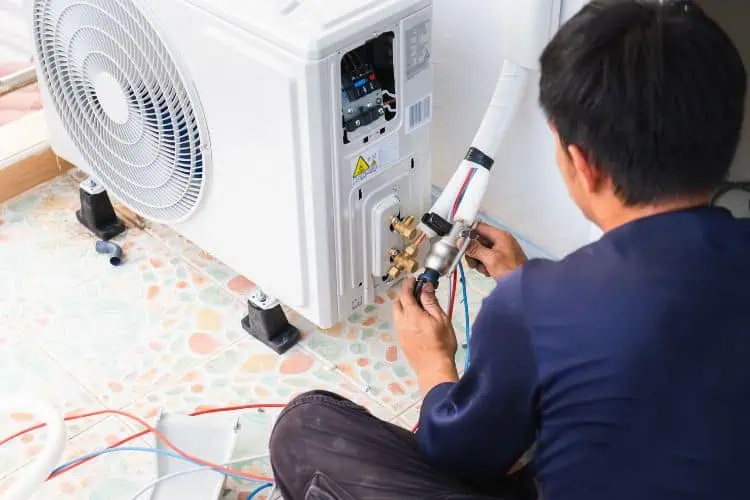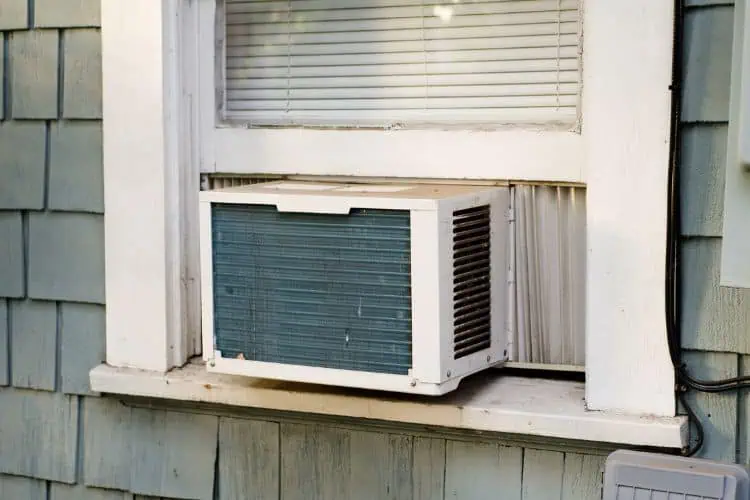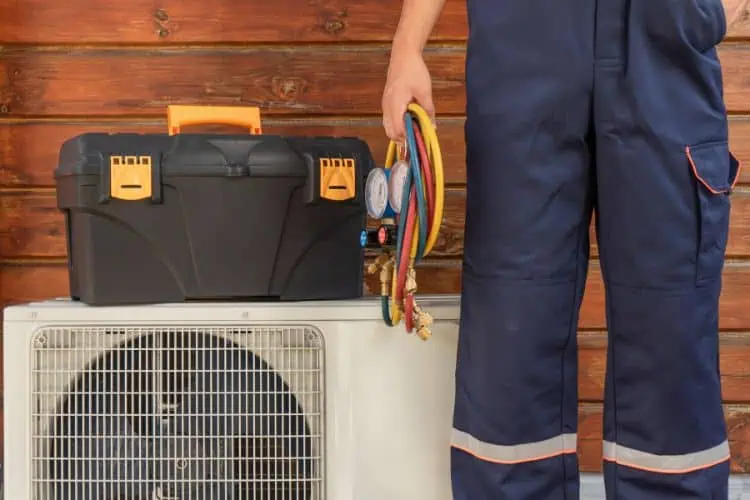Summers can turn many Australian homes into ovens. The escalating heat waves have some renters considering upgrades to beat the extreme heat.
Can a tenant install an air conditioner? Are landlords responsible for air conditioning?
In this guide, we’ll explore regulations on air conditioning in rental properties. We’ll also discuss how to enhance your living conditions during those hot, muggy days.
Can an Air Conditioner Be Installed By a Tenant?

Yes, a tenant can install an air conditioner if the landlord allows it. However, you can only install it on your own if you’re a certified technician—but more on that later.
You should seek prior approval for any upgrade not outlined in the lease agreement. Your initial step should involve sending a request to your landlord or property management before proceeding with any improvement to your rental unit.
But even if you have the green light on the air conditioner, installing it is another matter. Plug-in appliances might not warrant professional servicing, but make sure to follow local regulations.
Now, legal requirements for air conditioning systems can be strict and lengthy. In Queensland, for instance, the unit itself should meet specific standards, including DRED capability. Also, building codes put a minimum on the Energy Efficiency Ratio (EER) for cooling systems.
That said, you need a trained installer with a Refrigerant Handling License if your air conditioning requires ductwork and hard wiring.
Note: DRED, or Demand Response Enabling Device, enables energy providers to limit power supply to the AC unit during peak load use.
Are Landlords Responsible for Air Conditioning?
Air conditioning isn’t mandatory in rental agreements, but some landlords may provide it for additional rent. But to maximise their investment, owners and property managers may be extra careful when screening potential tenants.
Again, it won’t hurt to ask your landlord about getting an air conditioner. However, don’t expect them to jump on board right away.
Air conditioning is expensive, and some landlords simply cannot afford it. Besides, you might need council or strata approval before the installation. This is because of several considerations.
Will the air conditioner be installed on a shared wall in a building apartment? Is the unit extending over a public property? If you’re living in an older block, can the switchboard handle the additional load?
Additionally, some states, like Queensland, have strict rules on noise limits. For instance, your unit shouldn’t be louder than 5 decibels above background noise during particular hours of the day.
Chances are your neighbours will hear your noisy air conditioner more than you. So, it’s a potential issue you must plan for.
Do You Need Permission to Install a Window Air Conditioner?

Yes, you need approval to install a window-mounted air conditioner if you’re renting a strata unit. Strata is a form of ownership in apartment buildings and subdivisions with shared areas and facilities.
For example, perimeter walls, balustrades, and the external wall of a balcony are all considered common property.
The by-law often states that owners or occupants must not make alterations or attach structures to common property without written approval from the owner’s corporation (strata).
If you’re renting a detached house not covered by the strata scheme, review your lease agreement for rules about air conditioners.
It’s best to contact your landlord or property manager for confirmation. If you’re not making any permanent changes to the property, then having a window unit is a reasonable solution.
That said, enlist a professional to install your window air conditioner. An improperly installed unit can fall on a passer-by and result in legal repercussions.
What to Do if Your Rental Doesn’t Have Air Conditioning
Summers can be unbearable without air conditioning, especially if your rental unit lacks proper airflow. It’s something people who are working from home are acutely aware of.
Here’s what you can do to improve your living conditions during hot weather:
1. Negotiate With Your Landlord
Be open to negotiating with your landlord and discussing potential rent increases in exchange for essential improvements. Or, consider proposing a cost-sharing arrangement. Some landlords may be more inclined to approve your request if you’re willing to split the bill.
Air conditioning boosts the value of a property, and it’s a great point to sell your need for cooling. If you’re willing to shoulder all expenses, propose letting the landlord keep the unit when you eventually move out.
You can also discuss with the owner or property manager any medical conditions worsened by hot temperatures. You can secure a letter from your doctor explaining your situation.
Keep open communication with the owner or property manager, and follow up politely. If you reach a consensus, document it in writing to avoid future misunderstandings.
If, unfortunately, your landlord denies your request, your final resort is to move out. No one should have to suffer in the sweltering heat. Make sure to pack up all your possessions, as landlords have the right to dispose of belongings you leave behind.
2. Beat the Heat With Temporary Solutions
Even with your landlord’s approval, scheduling the installation can stretch for weeks, if not months. Consider these tips to stay cool while waiting:
- Position fans near windows to promote cross-ventilation. Place them in areas where you spend the most time.
- Open windows and doors during the cooler parts of the day or evening.
- Opt for lightweight and breathable bedding materials, such as cotton sheets, to ensure a more comfortable night’s sleep.
- Install reflective covering or blackout curtains to block out the intense sunlight. This helps to reduce indoor temperatures and minimise the heat entering your living space.
- Create DIY cooling solutions, such as placing a bowl of ice in front of a fan to circulate cooler air.
3. Invest in a Portable Cooling Unit
If your landlord rejects your request and leaving isn’t an option, get a portable air conditioner or evaporative cooler.
These units are versatile, easy to install, and can be moved from room to room. They don’t offer the same cooling power as central air conditioning, but they can make a noticeable difference in your comfort level.
Wrapping Up
So, can a tenant install an air conditioner?
Any improvement to your rental unit not specified in the lease agreement needs prior approval, and that includes air conditioning units.
Talk to your property manager or landlord before moving forward with any upgrades. If the landlord approves the installation, document the agreement in writing. Good luck!
